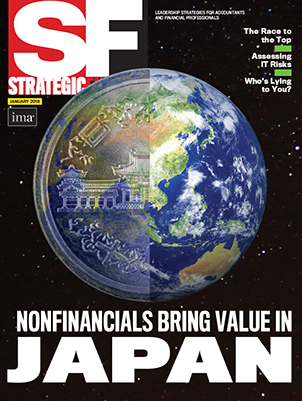IMA® (Institute of Management Accountants) has long considered an organization’s ethical culture to be significant and includes “advocacy of the highest ethical and best business practices in management accounting and finance” in its mission statement. The recently revised IMA Statement of Ethical Professional Practice adds a new Integrity requirement for IMA members to “contribute to a positive ethical culture.” It’s no longer acceptable for members to remain silent when observing an unethical or illegal act being committed. The newly revised Competence standard also adds a requirement for members to “recognize and help manage risk,” which includes reputation risk.
The culture or DNA in an organization is a key aspect of good governance in legal, ethical, and operational terms. It drives the decisions, behavior, and systems in the organization. For example, Section 882.1 of the U.S. Federal Sentencing Guidelines describes elements of an effective ethics and compliance program as requiring an organization to “promote an organizational culture that encourages ethical conduct and a commitment to compliance with the law.” In operational terms, an unethical culture is widely blamed for causing the unauthorized-account scandal at Wells Fargo, the meltdown at Uber, and the widespread accusations of sexual harassment, particularly in the motion-picture industry.
A strong ethical culture leads to many favorable strategic outcomes, including greater efficiency and employee productivity resulting from shared organizational core values. These benefits fall directly to the bottom line and can attract superior employees, reduce turnover, and achieve a lower cost of capital. A strong ethical culture also mitigates against risks of unethical behavior that can quickly diminish the reputation value of a brand that has been built up over decades.
CULTURAL VALUES
The November 2017 issue of the journal of the Risk Management Association contains “Culture Lessons from the U.S. Marine Corps.” Joseph Iraci, the author, is a former Marine and now risk manager in a prominent financial services organization. He believes that too often culture and the organization’s values don’t progress beyond words and fail to have an impact on day-to-day working responsibilities. After assessment for cultural fit by a Marine Corps recruiter, basic training instills the values of honor, courage, and commitment, which are reinforced throughout the service of officers and the enlisted alike. Iraci notes, “It is one thing to be aware that culture instills a sense of purpose and values. But it is critical to have processes and traditions that weave that culture into the firm’s DNA.”
A 2017 academic study, “Corporate Culture and Financial Reporting Risk: Looking Through the Glassdoor,” reports that “poorly implemented performance objectives leads to pressure and creates a boiler room effect, negatively impacting the corporate climate of the firm and increasing the propensity to manipulate performance metrics.” Findings of the study show that “firms with lower levels of job satisfaction (as measured by employees) and lower levels of ‘culture and values’ are more likely to be subjected to SEC fraud enforcement actions and securities class action lawsuits.” The study also reports that “a negative corporate climate is also associated with an increased likelihood of narrowly meeting or beating market earnings expectations.”
Awareness of the importance of culture has been heightened in the United States by the publication of The Report of the NACD Blue Ribbon Commission on Culture as a Corporate Asset by the National Association of Corporate Directors (NACD). It contains valuable information about the critical role that culture plays in strategy formulation, risk management, and goal achievement for enterprises of all sizes.
A strong ethical culture enhances financial and nonfinancial performance by encouraging behavior that’s consistent with core values and aligned with long-term strategic goals. Starbucks Executive Chair Howard Schultz notes: “The only competitive advantage we have is the culture and values of the company. Anyone can open up a coffee shop.”
CENTRALITY OF CULTURE
The NACD report notes that culture affects how employees at all levels behave, contrasting performance metrics as “what” gets done in the organization with cultural norms as “how” it’s accomplished. Culture represents how core values are expressed every day.
Culture as a Corporate Asset notes, “Similar to an organization’s people, intellectual property, technology, and other assets, culture is a key success factor that contributes to an organization’s competitive advantage and to long-term value creation.” Thus, corporate culture links closely with the growing focus on sustainability. The press release for the report states, “Organizations with strong, positive cultures have been shown to outperform their peers on everything from sales, customer satisfaction, safety, and quality, to profitability and productivity. Conversely, the absence of a healthy culture can create or exacerbate significant risks.” Yet in an NACD survey, less than half the directors reported that their boards assess the alignment between the company’s purpose and values and its strategy.
Globally, greater attention to culture is emerging as a key aspect of corporate governance. In 2016, The Netherlands adopted a new governance code. While not mentioning the word “ethics,” the new code provides that supervisory and management board members must create a culture in their organizations that promotes integrity among employees. The developer of the code, the Dutch Corporate Governance Monitoring Committee, notes, “A ‘healthy’ culture can reduce the chance of misconduct and irregularities.” The new governance guidance code also gives a central role to long-term value creation, which is designed to minimize the current emphasis on short-term financial results.
IMA ETHICS HELPLINE
For clarification of how the IMA Statement of Ethical Professional Practice applies to your ethical dilemma, contact the IMA Ethics Helpline.
In the U.S. or Canada, dial (800) 245-1383. In other countries, dial the AT&T USA Direct Access Number from www.usa.att.com/traveler/index.jsp, then the above number.
The IMA Helpline is designed to provide clarification of provisions in the IMA Statement of Ethical Professional Practice, which contains suggestions on how to resolve ethical conflicts. The helpline cannot be considered a hotline to report specific suspected ethical violations.

January 2018



